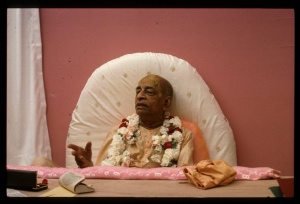CC Madhya 3.97 (1975): Difference between revisions
(Vanibot #0027: CCMirror - Mirror CC's 1996 edition to form a basis for 1975) |
(Vanibot #0020: VersionCompareLinker - added a link to the Version Compare feature) |
||
| Line 2: | Line 2: | ||
<div style="float:left">'''[[Sri Caitanya-caritamrta (1975)|Śrī Caitanya-caritāmṛta (1975)]] - [[CC Madhya (1975)|Madhya-līlā]] - [[CC Madhya 3 (1975)|Chapter 3: Lord Śrī Caitanya Mahāprabhu's Stay at the House of Advaita Acārya]]'''</div> | <div style="float:left">'''[[Sri Caitanya-caritamrta (1975)|Śrī Caitanya-caritāmṛta (1975)]] - [[CC Madhya (1975)|Madhya-līlā]] - [[CC Madhya 3 (1975)|Chapter 3: Lord Śrī Caitanya Mahāprabhu's Stay at the House of Advaita Acārya]]'''</div> | ||
<div style="float:right">[[File:Go-previous.png|link=CC Madhya 3.96 (1975)|Madhya-līlā 3.96]] '''[[CC Madhya 3.96 (1975)|Madhya-līlā 3.96]] - [[CC Madhya 3.98 (1975)|Madhya-līlā 3.98]]''' [[File:Go-next.png|link=CC Madhya 3.98 (1975)|Madhya-līlā 3.98]]</div> | <div style="float:right">[[File:Go-previous.png|link=CC Madhya 3.96 (1975)|Madhya-līlā 3.96]] '''[[CC Madhya 3.96 (1975)|Madhya-līlā 3.96]] - [[CC Madhya 3.98 (1975)|Madhya-līlā 3.98]]''' [[File:Go-next.png|link=CC Madhya 3.98 (1975)|Madhya-līlā 3.98]]</div> | ||
{{CompareVersions|CC|Madhya 3.97|CC 1975|CC 1996}} | |||
{{RandomImage}} | {{RandomImage}} | ||
==== TEXT 97 ==== | ==== TEXT 97 ==== | ||
<div class="verse"> | <div class="verse"> | ||
:tore nimantraṇa | :tore nimantraṇa kari' pāinu tāra phala | ||
:tora jāti-kula nāhi, sahaje pāgala | :tora jāti-kula nāhi, sahaje pāgala | ||
</div> | </div> | ||
| Line 18: | Line 17: | ||
<div class="synonyms"> | <div class="synonyms"> | ||
tore—You; nimantraṇa—invitation; | tore—You; nimantraṇa—invitation; kari'-making; pāinu—I have gotten in return; tāra—of that; phala—the result; tora—Your; jāti-kula nāhi—there is no indication of Your caste and family; sahaje—by nature; pāgala—You are a madman. | ||
</div> | </div> | ||
| Line 25: | Line 24: | ||
<div class="translation"> | <div class="translation"> | ||
Advaita Ācārya jokingly said, | Advaita Ācārya jokingly said, "My dear Nityānanda, I invited You, and indeed I have received the results. You have no fixed caste or dynasty. By nature You are a madman. | ||
</div> | </div> | ||
| Line 32: | Line 31: | ||
<div class="purport"> | <div class="purport"> | ||
The words sahaje pāgala ( | The words sahaje pāgala ("by nature a madman") indicate that Nityānanda Prabhu was transcendentally situated on the paramahaṁsa stage. Because He always remembered Rādhā-Kṛṣṇa and Their service, this was transcendental madness. Śrī Advaita Ācārya was pointing out this fact. | ||
</div> | </div> | ||
Latest revision as of 17:23, 27 January 2020

A.C. Bhaktivedanta Swami Prabhupada
TEXT 97
- tore nimantraṇa kari' pāinu tāra phala
- tora jāti-kula nāhi, sahaje pāgala
SYNONYMS
tore—You; nimantraṇa—invitation; kari'-making; pāinu—I have gotten in return; tāra—of that; phala—the result; tora—Your; jāti-kula nāhi—there is no indication of Your caste and family; sahaje—by nature; pāgala—You are a madman.
TRANSLATION
Advaita Ācārya jokingly said, "My dear Nityānanda, I invited You, and indeed I have received the results. You have no fixed caste or dynasty. By nature You are a madman.
PURPORT
The words sahaje pāgala ("by nature a madman") indicate that Nityānanda Prabhu was transcendentally situated on the paramahaṁsa stage. Because He always remembered Rādhā-Kṛṣṇa and Their service, this was transcendental madness. Śrī Advaita Ācārya was pointing out this fact.